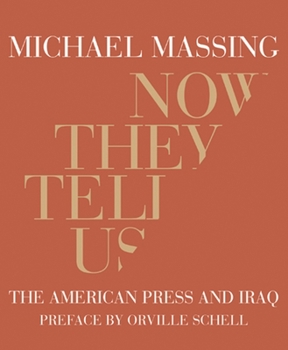Now They Tell Us
Select Format
Select Condition 
Book Overview
Michael Massing describes the American press coverage of the war in Iraq as "the unseen war," an ironic reference given the number of reporters in Iraq and in Doha, Qatar, the location of the Coalition Media Center with its $250,000 stage set. He argues that a combination of self-censorship, lack of real information given by the military at briefings, boosterism, and a small number of reporters familiar with Iraq and fluent in Arabic deprived the...
Format:Paperback
Language:English
ISBN:1590171292
ISBN13:9781590171295
Release Date:May 2004
Publisher:New York Review of Books
Length:112 Pages
Weight:0.65 lbs.
Dimensions:0.3" x 5.8" x 6.8"
Related Subjects
21st Century Censorship Communication & Journalism Communication & Media Studies History Iraq Iraq War Journalism Journalism & Nonfiction Language Arts Media Studies Middle East Military Political Science Politics & Government Politics & Social Sciences Social Science Social Sciences WritingCustomer Reviews
3 ratings
What They Didn't Tell Us
Published by Thriftbooks.com User , 17 years ago
This collection of updated clips running in the New York Times Book Review 2003-2004 offers a detailed log of the American press and their coverage of the days leading up to and during the Iraqi war. Massing sharply points out significant miscues, misinterpretations, and just plain ignorance on behalf of news organizations' editors that have played a key role in promoting and supporting the Bush administration into a war. The silencing of dissenting voices in the administration, the news organizations, and even the democratic opposition only exaggerated the political climate in our nation deferential to the Bush administration. Fresh off the pains of 9/11, Bush had the support and patriotism of the American people and no one was going to challenge that. No reporter was going to run articles critical of the administration. Massing shows how significant a role NY Times reporters Judith Miller and Michael Gordon played in the days leading up to the war. It goes to show how much power the media can flex when the atmosphere is ripe. Read this for yourself and you decide.
"No one wanted to be proved wrong."
Published by Thriftbooks.com User , 19 years ago
The title of Michael Massing's slim collection of essays, "Now They Tell Us" refers to the idea that American journalists failed to adequately present the facts about Iraq's alleged possession of the now-legendary Weapons of Mass Destruction. These facts, Massing argues, were available prior to the U.S. invasion of Iraq in 3/03, but the facts were obfuscated, ignored, downplayed or buried. The first essay, "The Unseen War" sets the stage for understanding exactly how most information about the war is delivered to the press. The essay begins with a description of the Coalition Media Centre in Qatar, and it's here that General Brooks delivers his press announcements. When "Now They Tell Us" was written, Jim Wilkinson ran the Coalition Media Centre. Wilkinson was also a spokesman for Rumsfeld during the 2000 elections, and he is currently Bush's deputy national security advisor for communications reporting to C. Rice. Massing describes how many reporters are reluctant to ask piercing questions (about civilian casualties, for example), as they are well aware that their names can be--as Wilkinson delicately phrased it--"put on a list." In other words, tough questions may result in not being called to ask questions at all. Massing also details some facts about al-Jazeera's coverage of the war and its emphasis on the civilian victims, and explains that even "live feed was being put on five-second delay" in order to allow MSNBC to edit out "disturbing" footage. The second essay, "Now They Tell Us" focuses on intelligence used before the war to justify the invasion of Iraq. Massing discusses the controversy over the notorious centrifuge tubes, the debates within the intelligence community, and the conflicting reports regarding the flimsy al-Qaeda-Iraq connection. Massing particularly skewers the journalist, Judith Miller and the reliability of her sources. Ms Miller's gallant protestations that it's "not my job to assess the government's information" just doesn't hold much weight. That excuse might work for a gossip columnist, but after all, she is supposed to be an investigative reporter, and one would assume that means checking out one's sources. In the instance of the centrifuge tubes, Miller was contacted directly with doubts and concerns. In the final essay, "Unfit to Print" Massing details the storm in a teacup occurring in the journalistic community as they examine, explain and justify their lack of accurate reporting prior to 3/03. I particularly enjoyed Massing's timeline illustrating the delay before some major U.S papers picked up the story about the Abu Ghraib scandal. Finally, Massing questions the notion that even embedded reporters are capable of reporting accurately about the war, and he illustrates this with a poignant example of a reporter who thinks she hears "the indecipherable chanting of muezzins, filling the air with a soft cacophony of Koranic verse." What the reporter heard and lyrically interpreted was actually cries "for a
Curious who this book is directed to..
Published by Thriftbooks.com User , 19 years ago
This is an excellent read detailing the failure of the US media to truly report the situation in Iraq. Mr Massing details many stories from independent reporters who have seen first hand the devastation that is happening daily which is never reported in the US. Although I enjoyed this book, I am curious as to who it is aimed at... those who are truly interested in world news never watch mainstream US media anyway. They know that if you want to know what is happening in the world, any US news media is the last place to go... Those people who do watch the US news media, probably do not care to know any more than what is already reported.





